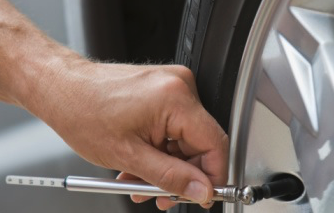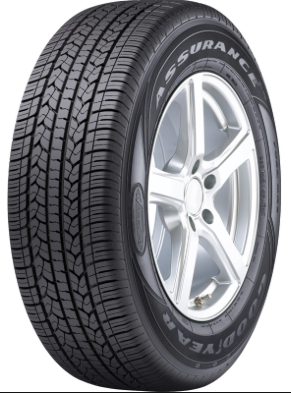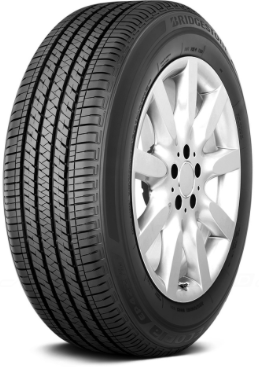Last Updated on July 7, 2024
Maximize Performance & Savings with the Right Fuel Efficient Tires
Optimizing your vehicle’s fuel consumption is more critical than ever in today’s rising fuel prices and environmental concerns. The tires are an often overlooked aspect that significantly affects your car’s fuel efficiency. But are fuel-efficient tires the right choice for your vehicle? Let’s delve deeper.
What are Fuel Efficient Tires?
Fuel-efficient tires have low rolling resistance that requires less energy than standard tires to propel them in the direction of travel. The easier it is to roll the tires, the less heat is generated, and the less fuel is needed to drive the vehicle. When tires heat, the tread will wear more quickly. Increasing the mileage you receive from a tire decreases the frequency of replacing your tires.
Fewer tires being this used is a good thing! Fuel-efficient tires, or low rolling resistance tires, are called “green tires” or “eco-tires” because they save a non-renewable resource and reduce harmful emissions.
How do they work?
The primary lies in the design and materials. These tires typically have a more complex rubber compound and specific tread designs, reducing the friction between the tire and the road.
How are Tires Made to Roll More Efficiently?
Over the years, tire designers have found ways to make tires roll more easily. One way is to reduce the weight of the tire. This can be done by using less or lighter materials. Another way is to use innovative materials like silica in the tread compound.
Silica and other additives can reduce the amount of unnecessary friction on the road surface. Tire manufacturers such as Nokian emphasize the environment and sustainability. Nokian uses only purified oils in their tire manufacturing, using no toxic or carcinogenic chemicals for tire production.
The tread pattern also has an impact. Small tread features arranged in circumferential rows around the tread typically roll more efficiently. Finally, fuel-efficient tires are usually designed to have stiffer sidewalls. Stiffer sidewalls reduce the amount of heat generated by the tire. Since less heat results in less energy consumed, more rigid tires are more fuel efficient.

Another important consideration for optimal fuel economy, regardless of the type of tire on your vehicle, is maintaining the correct air pressure. According to the U.S. Environmental Protection Agency, under-inflated tires can reduce fuel economy by about .2% for every one psi below the recommended air pressure.
The reason is that underinflated tires flexed more in the sidewall, creating more heat and lost energy. If your tires are even 5 PSI under-inflated, you are losing at least 1% in fuel economy.
This does not mean that higher inflation, above the recommendation, is a good idea. At the same time, this solution does reduce the tire flexes and the amount of rubber in contact with the road; however, this solution comes with too many trade-offs.
For example, an over-inflated tire will wear faster in the center of the tire, have less traction, and negatively impact the ride comfort and handling of the vehicle. It is always better to keep the air pressure at the vehicle manufacturer’s recommendation on the panel inside the driver’s door.
How Much Gasoline Will I Save?
Many factors impact fuel economy besides the correct inflation. The most significant factor is driving habits. If you are the driver who accelerates fast and brakes hard or is in a lot of stop-and-go city traffic, you will save up much more fuel than drivers who brake smoothly and gently. Good driving habits like this can save up to 10% in fuel economy.
Fuel-efficient tires have a significant impact, too. The typical low-rolling resistance tire should save somewhere between 1.0% and 4.0% per gallon compared to a traditional all-season that does not have low-rolling resistance features.
Using the current (Sept 2016) average of $2.20/gallon, the typical driver of the average domestic sedan would save approx. $30/year by choosing these types of tires vs. standard tires*. Over a four or five-year life plan for a set of tires, this can quickly add up to the equivalent value of getting one tire free.
Best Fuel-Efficient Tires for My Vehicle
In today’s environmentally conscious world, optimizing fuel efficiency isn’t just about the engine or driving habits; the tires you choose play a pivotal role, too. Fuel-efficient tires are specifically designed to reduce rolling resistance, translating to less fuel consumption and more savings at the pump. As the quest for sustainability continues, selecting the best fuel-efficient tires for your vehicle lightens the load on your wallet and our planet. Join us as we delve into the top picks and what makes them the ideal choice for the eco-savvy motorist.
Most premium tire brands have at least one style of fuel-efficient tire:
- The Good Ear Assurance Fuel Max is one of the most popular and heavily promoted “green” tires. They come in various sizes for all types of cars, minivans, SUVs, and trucks. With the Goodyear Assurance Fuel Max, you get confident traction in changing weather conditions, but with the bonus of enhanced fuel savings. According to Goodyear Tire’s internal testing, you can save up to 2,600 mi./4,000 km worth of gas over the life of 4 tires**.
- The Bridgestone Ecopia EP422 Plus is another popular super fuel-efficient tire model. Bridgestone says it can save you up to 20 miles per gas tank compared to a typical Bridgestone tire. The Bridgestone Ecopia EP422 Plus is just one of the many Ecopia fuel-efficient tire styles. All Bridgestone Ecopia tires are more extensive and use materials specially designed to reduce the amount of friction and heat generated as the tire rolls. Since there are many different Bridgestone Ecopia tire styles, you won’t have a problem finding one for your vehicle.
The Benefits of Fuel-Efficient Tires
Fuel-efficient tires are rapidly becoming the preferred choice for many motorists. Let’s explore their advantages in depth.
Savings: More Miles, Fewer Refills
- Maximized Efficiency: Fuel-efficient tires minimize their resistance when in contact with the road thanks to their design and materials. This efficiency means your vehicle’s engine doesn’t have to work as hard, leading to better fuel economy.
- Economic Benefits: In the long run, even a small percentage of fuel savings can increase. If you often drive long distances, the savings can be significant, allowing you to recoup the initial investment over time.
- Consistency in Performance: Besides saving fuel, these tires often provide a smoother ride, ensuring consistent performance and driving comfort.
Environmentally Friendly: Driving Towards a Greener Tomorrow
- Reduced Carbon Footprint: Every drop of fuel saved translates to fewer emissions. Over the lifespan of an energy-efficient tire, this can substantially reduce your vehicle’s carbon footprint.
- Sustainability: Many fuel-efficient tires are manufactured using eco-friendly methods and materials, enhancing their green credentials.
- A Cleaner World: Less fuel consumption means fewer pollutants like nitrous oxides and hydrocarbons are emitted, resulting in cleaner air and a healthier environment.
Extended Tire Life: A Long-Lasting Investment
- Durable Design: Fuel-efficient tires are often crafted with materials that promote longevity without compromising their low rolling resistance.
- Cost-Effective: While the upfront cost might be slightly higher than standard tires, the extended lifespan of fuel-efficient tires means fewer replacements over the years. This longevity can lead to significant savings in the long run.
- Safety Enhancements: A longer-lasting tire means the tread remains intact for extended periods, ensuring better grip and reduced chances of accidents due to worn-out tires.
Opting for fuel-efficient tires is not just a decision for the present. It’s an investment in the future – for your wallet, your driving experience, and the planet.
- Durable Design: Fuel-efficient tires are often crafted with materials that promote longevity without compromising their low rolling resistance.
- Cost-Effective: While the upfront cost might be slightly higher than standard tires, the extended lifespan of fuel-efficient tires means fewer replacements over the years. This longevity can lead to significant savings in the long run.
- Safety Enhancements: A longer-lasting tire means the tread remains intact for extended periods, ensuring better grip and reduced chances of accidents due to worn-out tires.
Opting for fuel-efficient tires is not just a decision for the present. It’s an investment in the future – for your wallet, your driving experience, and the planet.
Where can I buy fuel-efficient, low-rolling resistance tires?
If you want to save money at the pump and reduce your carbon footprint without compromising safety or how long your tires last, Tires-easy has a great selection of fuel-efficient tires. Here are some of our best sellers:
- Michelin Energy Saver A/S
- Toyo Versado Eco (specially designed for Hybrid and electric vehicles)
- Nokian Entyre 2.0
Our vast selection of these and other tires at the best possible prices won’t disappoint you!
Conclusion
Fuel-efficient tires offer a compelling package of benefits, from savings at the pump to a reduced environmental footprint. However, the decision should be based on your vehicle type, driving habits, and the conditions you frequently encounter.
Are you thinking of making the switch to fuel-efficient tires?
Please browse our extensive range at Tires Easy and find the perfect set for your vehicle. Invest in a more intelligent, greener drive today and explore top-tier fuel-efficient tire options only at Tires Easy.
FAQs
Does fuel-efficient tires make a difference?
Yes, fuel-efficient tires can make a noticeable difference. They are designed with low rolling resistance, meaning the engine exerts less effort, leading to reduced fuel consumption. Over time, this can result in significant savings at the pump.
What kind of tire is better for fuel efficiency?
Tires labeled “low rolling resistance” or “fuel-efficient” are designed for better fuel efficiency. They are constructed with unique rubber compounds and tread designs to minimize the energy lost as the tire rolls, translating to less fuel use.
Are fuel-efficient tires good?
Fuel-efficient tires are beneficial in terms of fuel savings and reduced carbon emissions. However, their performance in terms of grip, especially in wet conditions, might differ from regular tires. It is essential to read reviews and ratings specific to each model to determine their overall performance.
Which tire is better for fuel efficiency, wide or narrow?
Narrow tires generally offer better fuel efficiency than wider ones. This is because they have a smaller contact area with the road, leading to less rolling resistance and, therefore, less fuel consumption. However, wider tires might provide better grip and handling. It’s essential to balance fuel efficiency with performance and safety considerations.













